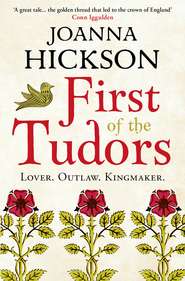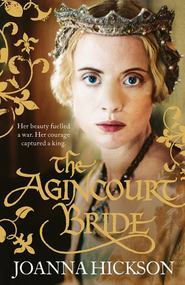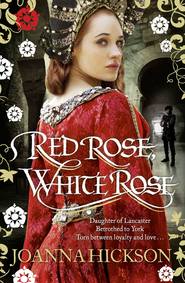По всем вопросам обращайтесь на: info@litportal.ru
(©) 2003-2025.
✖
The Tudor Bride
Автор
Год написания книги
2018
Настройки чтения
Размер шрифта
Высота строк
Поля
Handing him the napkin to dry his hands, I jogged the basin and a little water spilled over my apron. Brushing it off gave me a moment to gather my thoughts for a response. ‘I am sure I do not know, your grace,’ I said, retrieving the napkin from him. ‘Churlish is not a word I would associate with Madame. But I do know that she refused to be shown Kenilworth castle by anyone but you.’
King Henry turned to Catherine, raising an enquiring eyebrow. ‘Is that true?’ he asked.
I turned to offer the basin to Catherine. Her face wore a slightly mulish expression and I thought she was going to chastise me, but eventually she gave a direct answer to the king’s question. ‘Yes, it is true and it is because you once told me that this is where you discovered love – the love of your mother and your brother Thomas.’
I could not see King Henry’s face because I was dealing again with the bowl and napkin but his voice sounded gruff. ‘We were always happy here at Kenilworth when our mother was alive,’ he acknowledged. ‘But my younger brothers and sisters cannot remember her as vividly as Thomas and I. She made this place a playground and every corner of it contains memories of her presence.’
King Henry leaned over to take Catherine’s hand. ‘I learned my military skills on the Welsh border, but it was here that my mother taught me to love music and books and poetry and all the things that raise men above the animals. In recent years I have been too busy fighting to enjoy the finer things of life, until God blessed me with a beautiful wife as my companion. I too have missed you and missed sharing your bed, my sweet love, but I thought it best to let your body recover after our great disappointment. I believe that my mother died from giving birth too young and too often. My sister Philippa was her eighth child in ten years and she was worn out. She died of exhaustion at the age of twenty-four. I hold you too dear, my Catherine, to allow anything similar to happen to you.’
At this point I thought it tactful to move away from the table. I may be accused of undue prurience, but I was as anxious as they that normal marital relations should be resumed and the essential heir conceived as soon as possible. At the same time, I needed to preserve my close relationship with Catherine because while King Henry would doubtless be off on campaign as soon as a pregnancy was established, I was the one he would hold responsible for nurturing it to a successful conclusion. It was obvious that they both fervently desired each other – you could feel the sexual urgency crackling between them – but while Catherine’s desire for him was artless and emotional, his desire for her was controlled and dynastic – or so I thought …
I took a seat in the shadows beside the fireplace hood where I could not see or be seen by the two diners, but it was not long before I leaped up again in response to a loud bellow from the king.
‘Guillaumette! Where are you when we need you? Come and unlace this tiresome gown!’
The sunset gown was beautiful to behold, but needed the services of a maid to release the wearer from its clutches. I hurried to perform the task, pulling the gold laces from their hooks as quickly as I could while the squire Robin took the narrow stair down from the minstrel’s gallery two steps at a time to come to the aid of the king. Nothing was said but the king and Catherine never took their eyes off each other as we undressed them and when they were both reduced to their chemises, King Henry gathered his queen in his arms and almost threw her onto the embroidered silk cover of the great tester bed. The squire and I had scarcely managed to give them the privacy of the crimson curtains before we heard the urgent sounds of passionate love-making. We exchanged wry glances and while he hastened to set a reviving flagon of wine and accompanying cups on a side table, I retired to the hearth to stoke up the fire. As I stirred the embers and sent sparks flying with fresh logs, I could not suppress a gurgle of mirth, picturing my incendiary task as a metaphor for what was taking place only yards away behind the drawn bed-curtains. A few days and nights of this, I thought with an indulgent smile, and England would soon have its longed-for heir.
6 (#ulink_18ed1b25-5588-5a18-a03e-1ec41735b25e)
For three days and nights, the king and queen scarcely left the confines of the hall with its blazing fire and accommodating bed. Soon after dawn on the first morning, I took it upon myself to commandeer the boat and boatman to take me across the lake to fetch fresh clothes and other necessities for Catherine and we returned with a priest and the clerk, Walter Vintner, his scrip full of letters and documents for King Henry’s attention. Fragrant new loaves from the castle bake-house, milk and cheese from the dairy and a large basket of fruit and vegetables had also been loaded on board, an indication that the king would not be leaving imminently, and who could blame him?
During the return journey, being privy to the royal itinerary, young Walter proved a fruitful source of information. ‘The king intends to visit Coventry and Leicester while he is at Kenilworth and the queen is to go with him. They will stay on here until after Easter and then they are to make a progress through the northern shires. I hope you will not suffering unduly from all that riding, Madame.’ A mischievous grin crossed the young clerk’s face.
I shot him an indignant glare. ‘It is not I who bears the strain, Master Walter, it is my stalwart mare. Perhaps on your return to the castle you might be kind enough to check that Genevieve is well tended in the stables.’
‘No need, Madame. I went there last night to check my own cob and met Lady Joan Beaufort, who told me she had been speaking to the stable master about all the queen’s horses, so I think you may be reassured on that score.’
I was impressed. ‘I will tell the queen that her youngest maid of honour shows great initiative. Although I am afraid it may only confirm her opinion that Lady Joan cares too much for horses.’
Walter made an appreciative noise. ‘She is a beauty though, is she not, Madame? Many a young squire would be happy to loosen her girths!’
I glanced at the priest’s back, straight and prim on the forward thwart and wondered if he had heard the last remark. ‘Whoa Master Vintner!’ I murmured reprovingly. ‘Lady Joan is the king’s cousin and destined for a great match. You had best keep your eyes down if you value your position!’
He had the grace to look a little sheepish. ‘I was just saying … I do not aspire to a high-born love, I assure you. However, if I did, I would pick Lady Joan over that Eleanor Cobham. She is another beauty right enough, but I reckon she would be a handful – and I do not mean in a buxom way!’
I decided there and then that it was time Master Vintner found himself a wife and wondered if he had a sweetheart at home in London. A position like his in the royal household did not lend itself to a steady domestic life and I knew that many of the courtiers in the king’s retinue made use of the whores who were allowed to follow at the back of the train if they submitted themselves to the court physicians for regular health checks. My curiosity did not extend to questioning Walter on this matter however.
The royal couple were still abed when we returned, giving time for breakfast to be prepared and warm water to be brought for washing. After dressing quickly, the king spent half an hour with his clerk in an adjoining chamber while Catherine stood before the fire in a dreamy reverie, allowing me to dress her in a simple kirtle and warm fur-lined over-dress of the sort the English called a côte-hardie; a very French name for a garment which I had never seen worn in Paris, at least not by a woman. I had acquired it for Catherine in London, thinking it a practical style for informal wear.
It was not until she was fully clothed that she even noticed her apparel but then she commented on it. ‘Is this new, Mette? I have not seen it before.’
‘Yes, Mademoiselle. It is an English style. A little old-fashioned, perhaps, but I thought it suitable.’
She fingered the fine cornflower-blue wool. ‘It is a pretty colour but why now, particularly?’
I gave a casual shrug. ‘You may notice that it has no lacing at the back.’
A sly glance showed me that she was digesting the significance of this remark. Then an irrepressible giggle burst forth, which soon developed into a lusty laugh. ‘Oh, Mette, you are a rogue!’ she cried when she could speak. ‘Sometimes I think you forget that I am a queen.’
‘Only when you do yourself, Mademoiselle,’ I assured her. ‘Which is when you are happy – as you were last night, unless I am very much mistaken?’
‘No, Mette, you are not mistaken,’ she admitted twisting to and fro, trying to find a fastening in the loose garment which skimmed the hips and had characteristically wide arm-holes. ‘But I will be even happier when I discover how I get out of this.’
I moved forward to unfasten the plaited silk girdle around her hips. ‘Undo this and just lift it over your head,’ I explained. ‘Or get your lover to do it for you,’ I added with a twinkle.
She gave me a reproachful look. ‘My husband, Mette,’ she corrected primly. ‘King Henry is my husband.’
I assumed a suitably contrite expression. ‘Forgive me, Mademoiselle. Last night I mistook him for your lover and I hope to do so again tonight.’
I could see her wrestling with herself, undecided whether to chastise me or to concur. I hoped she would soon discover an ability to be both queen and coquette.
She and her lover-king settled into a relaxed companionship which lasted until Easter. It was interrupted by an official two-day visit to Coventry, when they were fêted and entertained and Catherine’s beauty and charm loosened the purse-strings of the rich merchant guilds so that the king’s campaign coffers were much replenished as a result. They returned to the Pleasance and a few more days of private indulgence before taking up residence in the formality of the castle to celebrate the feast of Easter with the rest of the court.
When we finally left Kenilworth, the royal household took up a nomad existence, heading north and riding a minimum of twenty miles a day. King Henry was an impatient traveller and tended to push the timetable to the limit. An overnight stay would always include an official dinner with opportunities either for fund-raising and recruitment or a visit to a chapel or shrine. By the time we reached York, a hundred and twenty miles north of Kenilworth, we had visited ten cold, grey shire towns and monasteries and March was well behind us.
Catherine was tired and, sensing this, King Henry suggested that she stay in York and rest while he fulfilled his vow to visit the famous shrines of two northern saints, St John of Bridlington and St John of Beverley. Since the many pilgrims to such locally popular shrines greatly enriched their attendant abbeys and priories, he also took the opportunity to obtain further financial support. Religious houses were a fruitful source of campaign funds because farmland that did not have enough men to work it quickly became unproductive and shrewd abbots preferred to offer the king substantial loans rather than provide rustic recruits for the campaign army.
In York we lodged at the house of the Dean of the Minster, and Catherine spent time praying in the beautiful cathedral-church. Meanwhile King Henry completed his pilgrimage a shaken man, having received disastrous news on the return journey from Bridlington. He maintained a calm façade in public and during the evening meal in the dean’s presence, but his outward shell cracked as soon as the door closed behind them in the bed chamber.
He sank to his knees at the queen’s feet, burying his face in the folds of her her skirt, like a little boy seeking comfort from his mother. ‘Oh, Catherine, God has sent me a grievous trial. My beloved brother, Thomas, is dead, killed in a battle at Easter-tide.’
With a cry of horror she sank to her knees before him, taking his face in her hands. ‘My dearest lord, this is dreadful news. How – when – did you find out?’ Her own blue eyes blurred with tears and she called in an anguished voice, ‘Mette, bring wine! My lord needs strength.’
I hurriedly poured two cups of the strong Bordeaux wine provided by the dean’s cellarer. Catherine had persuaded King Henry back to his feet and they sat down together on a cushioned bench beside the chamber fire. Their hands shook as they took the cups.
‘A courier met me on the road with a dispatch,’ the king explained.
Catherine gasped with dismay. ‘Then the duchess does not yet know? Poor lady! She loved your brother so dearly.’
Henry nodded slowly and sorrowfully. ‘Yes, theirs was a love match like no other. It was a forbidden marriage, but our father was eventually won over. How am I going to tell her? She will be devastated. We should send for her before she learns the news from any other lips but ours. Perhaps Mette would bring her here?’
‘Ah yes, Mette, would you go please?’ Catherine endorsed his request, adding, ‘And bring Lady Joan also. Poor girl.’
‘Yes, Madame.’ I dipped my knee before hurrying to perform the unwelcome task. The Duchess of Clarence and Lady Joan were lodged with their entourage in a house nearby and had taken their evening meal there. When I relayed the king’s summons, they responded immediately, donning warm cloaks against the cold night.
The duchess was understandably curious, but I parried her queries about the reason for the summons, struggling to hide my knowledge that she was only moments from despair. I had brought a lantern and we were able to pick our way quickly across the flagstones of the Minster court without mishap. I thought it best to admit her and her daughter to the royal chamber and then retire. Despite their high status, this was above all a family bereavement and the terrible news should surely be broken in private. After only a few moments, I heard the duchess’s long and heart-rending cry of grief and made the sign of the cross.
I was full of admiration for Margaret of Clarence during the ensuing days as the royal progress followed the spine of England south to Windsor. It seemed it was not the custom here, as it was in France, for everyone and everything to be plunged into black mourning at the death of a prominent person; besides, no thought was given to protracted obsequies because the king was preoccupied with planning his new campaign which was now more imperative than ever. Masses were sung in the Minster for the Duke of Clarence’s soul and, when we set out from York, his duchess rode beside the queen as usual, sitting straight-backed and proud on her beautiful, high-stepping horse and Lady Joan rode close to her mother’s side, not among the other ladies-in-waiting as she had done hitherto.
It transpired that the Duke of Clarence had not been the only death at the disastrous Battle of Beaugé. Two other royal knights had been killed and there had been prisoners taken, among them, to add to the duchess’s burden of misery, her two sons John, Earl of Somerset and Edmund Beaufort, the young squire who had acted as a special messenger between Catherine and the king during their so-called ‘siege-honeymoon’ which followed their wedding in France.
During the second day of our long journey south, King Henry singled the duchess out for a long horseback discussion and I was surprised when, at the same time, Lady Joan sidled her horse up to mine. Long bouts of crying had left the girl’s normally smooth-skinned face rather blotched and puffy and my heart went out to her.
‘May I speak with you privately, Madame Lanière?’ she asked in French.
‘Of course, Mademoiselle,’ I replied, happy to use my own language for once. I kicked Genevieve to move out to the side of the column where we should not be overheard. ‘How are you and your lady mother? It must be hard riding out in public at such a time of great sadness.’
She shook her head. ‘Oh no, I am glad to be on a horse and out in the air,’ she said. ‘Much better than being cooped up indoors with nothing to think of but the death of my stepfather and the captivity of my two brothers. I just wish I knew how they were, I believe they are injured.’









